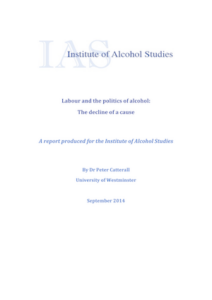View this report

Written by Professor Peter Catterall
My aspiration here is to write the politics of alcohol back into labour history, to support and develop Jones’ argument that these politics remained important for Labour after the Great War, and to consider the range of ways in which that was the case. In the process, the highly-politicized atmosphere surrounding alcohol policy in which Labour pioneers grew up was internalized and adapted to the socialistic creeds they adopted. The politics of alcohol, it will be argued here, affected thinking about the moral responsibilities of the individual Labour politician, and about the changed moral and social order they aimed to engender. Furthermore, the politics of alcohol certainly had a continuing electoral dimension into the inter-war years. Labour faced the problem of managing the tension between the idealism of the many temperance advocates amongst its early leadership and its aim to win the suffrage of a sometimes hard-drinking working class.
View this report
